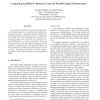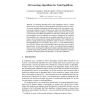1410 search results - page 6 / 282 » The Algorithmics of Solitaire-Like Games |
111
click to vote
ICML
1998
IEEE
16 years 1 months ago
1998
IEEE
In this paper, we adopt general-sum stochastic games as a framework for multiagent reinforcement learning. Our work extends previous work by Littman on zero-sum stochastic games t...
112
click to vote
STOC
2006
ACM
16 years 28 days ago
2006
ACM
Unique games are constraint satisfaction problems that can be viewed as a generalization of Max-Cut to a larger domain size. The Unique Games Conjecture states that it is hard to ...
108
Voted
ISPDC
2008
IEEE
15 years 7 months ago
2008
IEEE
We consider the problem of computing all Nash equilibria in bimatrix games (i.e., nonzero-sum two-player noncooperative games). Computing all Nash equilibria for large bimatrix ga...
102
Voted
SAGT
2010
Springer
14 years 11 months ago
2010
Springer
Can learning algorithms find a Nash equilibrium? This is a natural question for several reasons. Learning algorithms resemble the behavior of players in many naturally arising gam...
130
Voted
COCO
2005
Springer
15 years 6 months ago
2005
Springer
Refereed games are interactive proof systems with two competing provers: one that tries to convince the verifier to accept and another that tries to convince the verifier to rej...


